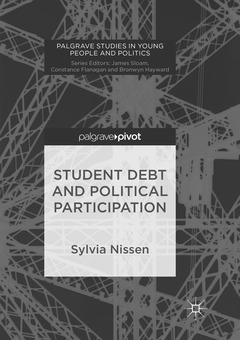Student Debt and Political Participation, 1st ed. 2019 Palgrave Studies in Young People and Politics Series
Auteur : Nissen Sylvia

1. Debt and democracy
2. Student loans: An awkward subject
3. Inequality and participation
4. Precautionary politics
5. Rethinking debt for students as citizens
Appendix: Methods used
Index
Sylvia Nissen is a lecturer in the Department of Environmental Management at Lincoln University, Christchurch, New Zealand. Her research focuses on young people, politics and democracy in a context of environmental change. She has published a chapter in an international volume, Student Politics and Protest (2017, edited by Rachel Brooks), and contributed to the Journal of Urgent Writing (2017, forthcoming) and New Zealand Sociology (2016).
Focuses on the political repercussions of students debt, particularly for political action and agency
Explores student experiences of debt presenting evidence from 70 in-depth interviews with students
Reconsiders how the underlying conditions of democracies are shaping the political imagination and agency of students as citizens
Date de parution : 10-2018
Ouvrage de 105 p.
14.8x21 cm
Disponible chez l'éditeur (délai d'approvisionnement : 15 jours).
Prix indicatif 58,01 €
Ajouter au panierThèmes de Student Debt and Political Participation :
Mots-clés :
student debt; student experiences; public dialogue; student loan schemes; appraisals of student debt; variation in experience; risk; emotion; private responsibility; contribution of student debt to inequality; economic inequality; participation in public life; political engagement; precautionary principle; political agency; pragmatism; repercussions of student loan debt; student debt crisis; university education; tuition fees



